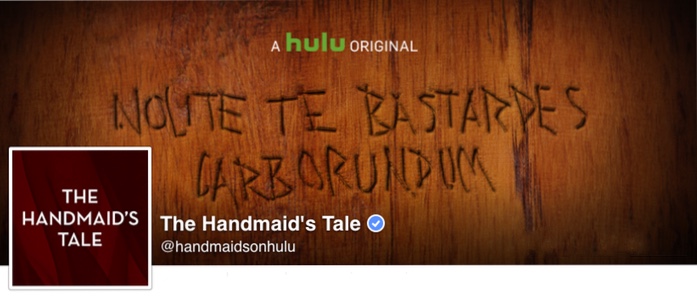How a Historian Inspired a Miniseries with a Dark Message that’s Especially Relevant in the Age of Trump
A seminal Harvard historian of Puritanism named Perry Miller in part inspired The Handmaid’s Tale, one of the greatest science fiction novels of the twentieth century. Published in 1985, and arguably the most chilling dystopian novel ever written, the text is presented as a near-future account of a woman only known as Offred (or, “Of Fred”) suffering under a theocratic government defined by its oppression of women. Few readers of the popular book would have been familiar with Miller, whom the novel was dedicated to, and who was the Canadian novelist’s professor while a Harvard PhD student. Considering that on April 29th it was announced that Hulu and actress Elizabeth Moss will be producing a miniseries adaptation, it’s worth considering the ways that Miller influenced Atwood’s opus.
First, a brief synopsis for those unfamiliar with the plot: Offred is a so-called “Handmaid” who is the property of a prominent authority in the new theocratic Republic of Gilead, and whose sole purpose is to breed the children of her master after an unspecified ecological disaster has rendered the majority of women infertile. Narrated from a nameless city that is clearly meant to be the environs around Boston (Atwood presents us with the image of heads on pikes next to Widener Library), the eerie verisimilitudes of the text make it seem almost like an object from some parallel universe.
Studying with Miller at Harvard was integral to her decision concerning the setting; what’s particularly effective is that this totalitarian society is presented in a in a city that is so stereotypically liberal. The Handmaid’s Tale serves as a sobering reminder and warning that as in Berlin or Tehran before it, seemingly open, tolerant, and permissive places can quite quickly become reactionary. Written under the specter of the Islamic revolution in Iran and the worrying ascendancy of the Christian right in the United States, Atwood extrapolated the possible consequences of a fundamentalist moment in a future America. This was based on an understanding of its theocratic past that she inherited from Miller.
As a historian Perry Miller was the veritable dean and father of American Puritan studies. In works like The New England Mind: The Seventeenth Century (1939) and Errand into the Wilderness (1956)Miller helped to make Puritan New England a respectable field of scholarly study. An integral member of the Office of Strategic Services (the precursor to the CIA) during World War II, whose work was possibly instrumental in the development of their Psy-Ops division, Miller was not just theoretically familiar with authoritarian societies, but indeed saw their work first hand from his military. Before Miller American historians often hewed to the nineteenth-century stereotype of Puritans as simply doctrinaire scolds, superstitious colonists not to be taken particularly seriously. Miller, on the other hand, presented an argument for the sophistication of the American Puritans; and though he was personally an atheist he had intense respect for their intellectual rigor, though he remained cognizant of their often oppressive behavior. But it’s precisely their intellectual rigor that made the Puritans so disturbing to Atwood.
Discussing Miller’s influence on the novel, she said, “You often hear in North America, ‘It can’t happen here,’ but it happened quite early on. The Puritans banished people who didn’t agree with them, so we would be rather smug to assume that the seeds are not there.” Indeed this is precisely what Miller’s scholarship offered her, a warning about the dangers of smugness. The Puritans were among the most educated people to grace American soil (the founders of Harvard and Yale after all) and yet they were the same who expelled Roger Williams and Anne Hutchinson, the same who executed twenty at Salem. Reflecting on this legacy, Atwood explains, “That’s why I set the book in Cambridge.”
This is arguably one of the elements that elevated the novel to greatness. In the hands of a lesser author it would be easy to associate this paternalistic totalitarian state that defines women entirely through their reproductive capabilities with the great swaths of the United States that are so often depicted as backwards (in fact she does the opposite, referencing Appalachian rebels fighting Gilead). Rather her point is precisely that the ultimate conclusion of misogynistic sentiment in our society could just as easily see progressive areas quickly becoming horrifically authoritarian. As a 22nd century historian in the afterword to the novel writes, “As all historians know, the past is a great darkness, and filled with echoes. Voices may reach us from it; but what they say to us is imbued with the obscurity of the matrix out of which they come; and, try as we may, we cannot always decipher them precisely in the clearer light of our own day.” Deciphering what they mean isn’t always easier in the present.
From Miller’s reading of the Puritans as both educated, and oppressive, Atwood understood that geography is not always destiny and that smugness and complacency can make those living comfortably in cosmopolitan environs overlook the presence of wolves in their own midst. The Hulu adaptation is a welcome, and appropriate development during our current presidential season. This cycle will probably see a competition between the first female nominee of a major party against one of the most openly chauvinistic candidates in recent political memory. The later is a candidate who has called for the legal punishment of women who have had abortions, who openly mocks the appearance of women whom he disagrees with, and who with a patronizing smirk has claimed to voters that he “cherishes women.” As both Miller and Atwood would remind you, and as The Handmaid’s Tale would suggest, the later candidate’s Manhattan address does not somehow exonerate him. The moral of both teacher and student is that tyranny can still be born in the freest of places, and is all the more terrifying because of it.
